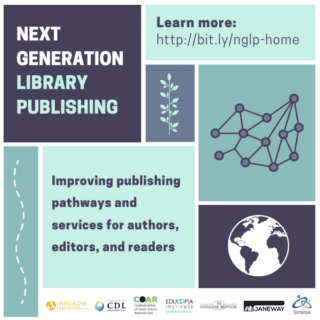
May 17, 2022
Seeding a Community of FORESTers
By Hilary Faith HickmanHow well do your policies and practices align with your values? And how well do your vendors’ and partners’ policies and practices align with your values?
Do you know? Would it change your investment choices if you did?
We believe that if there were clearer ways to evidence and assess actions against values, it could.
The Next Generation Library Publishing (NGLP) team is excited to announce the release of the FOREST Framework for Values-Driven Scholarly Communication. This framework has been created to help scholarly communication organizations and communities to demonstrate, evaluate, and improve their alignment over time with six key values:
Financial and Organizational Sustainability
Openness
Representative Governance
Equity, Accessibility, and Anti-Oppression
Sharing of Knowledge
Transparency
These six core values have appeared in dozens of manifestos, open letters, and other statements issued by a broad range of academic stakeholders, including faculty, students, publishers, librarians, and open source tool developers. They are representative, if not emblematic, of the open scholarship movement and of academic intentions in much of the world. These values were selected, defined, and vetted publicly by the Next Generation Library Publishing team between 2019-2022 (see “Living Our Values and Principles: Exploring Assessment Strategies for the Scholarly Communication Field”). The FOREST framework is not designed to compete with, but rather to support, existing values statements and approaches.
The FOREST Framework offers concrete mechanisms that communities can use to assess how their policies and practices align with these values and their associated principles. Rather than taking a “scorecard” approach that assumes there is a moment when a value has been fully realized, the framework focuses on a “spectrum” approach that recognizes incremental improvements in alignment and draws attention to growth and progress over time. It invites reflection on ways to manifest and live the values we espouse, making room for organizations and communities of different sizes, maturity, and mission to demonstrate their intent to practice in ethical and sustainable ways.
We hope the FOREST Framework will be useful to a wide variety of stakeholders in the scholarly communication arena–from publishers who are deciding what tools and platforms they should invest in, to editors who are advocating for their publishers to better align with academic values, and from service providers who use this to self-assess and improve adherence over time, to procurement offices that are making decisions about what vendors to choose.
We also hope these stakeholders will help to evaluate and improve the FOREST Framework as a living document that should remain responsive to the communities it serves.
About the Project
The Next Generation Library Publishing project (led by Educopia Institute, California Digital Library, and Stratos, in close collaboration with COAR, Janeway, and Longleaf Services, and generously funded by Arcadia), seeks to improve the publishing pathways and choices available to authors, editors, and readers through strengthening, integrating, and scaling up scholarly publishing infrastructure to support library publishers. In addition to developing interoperable publishing tools and workflows, our team is exploring how to create community hosting models that align explicitly and demonstratively with academic values.
The FOREST framework is an essential component of our work to transform the academic publishing sector. We are planting seeds of change in three interconnected areas that we believe hold great potential to transform scholarly publishing: alignment with academic values and principles, technical interoperability, and collaborative business networks.